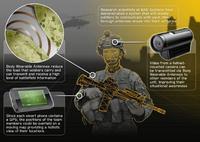-
Expert questions DHS grants for rural communities following 9/11

In the decade since 9/11, the U.S. government has poured more than $1.3 million into the rural community of Ross County, Ohio, which some argue is a waste of federal resources; the funds were ostensibly designed to prevent terrorism, but much of the money has been spent to bolster emergency response capabilities in the event of a major disaster whether it be natural or manmade
-
-
Researchers show facial-reading lie-detector

New lie detecting system records subtle clues that people give off when lying, such as increased blood flow around the eyes, tiny lip movements, or nose twitching; one of the major selling points of such technology would be its use in situations where the person being targeted does not know they are being tested
-
-
NYPD remains on high-alert following 9/11

Officials in New York remain on high-alert following the warning issued by DHS that terrorists might be plotting an attack on the city for the ten-year anniversary of 9/11; NYPD have pulled back the additional security measures put in place for the ten-year anniversary like checkpoints at ports of entry and bridges, but remain on vigilant for a potential bomb attack
-
-
Texas drought forces military to change training

A particularly severe drought in Texas has forced the military to change the way it trains its soldiers due to the risk of starting fires; law enforcement agencies would benefit from taking note of additional safety measures put into place
-
-
Supreme Court to rule on age of "Big Brother" surveillance

This November the Supreme Court is gearing up to hear a landmark case which will decide how far law enforcement agencies can pry into an individual’s private life; federal judges argue that the use of GPS surveillance by law enforcement is an “Orwellian intrusion” into private life and violate the Fourth Amendment; meanwhile police say GPS tracking is simply a more efficient way to tail a suspect’s car or track their movements, things they can currently do without a warrant
-
-
$1.1 million order for Implant Sciences' portable explosives detectors
Implant Sciences Corporation, a developer of explosives detection technology, recently announced that it had received a $1.1 million order for its portable explosives detection systems; with the latest purchase, Implant Sciences will supply its Quantum Sniffer QS H-150 portable devices to the Middle East for use by critical infrastructure operators
-
-
General Dynamics to integrate CBRN device in Army radios
General Dynamics C4 Systems announced last week that it will work with U.S. Army researchers to install wireless-networking chips on radios that can also detect the presence of dangerous chemicals on the battlefield
-
-
Body wearable antennas for soldiers, first responders

Body Wearable Antennas (BWAs) allow soldiers to communicate with their colleagues on the front line without the need for conventional radio whip-antennas which can be cumbersome and conspicuous; NWS can also be incorporate into the suits of fire-fighters for use during search and rescue, for police patrol team members to have the GPS locations of their colleagues, and in other hazardous industries such as mining, oil, and gas
-
-
Flying video camera will protect soldiers

Engineers have developed the U.K.’s first lightweight outdoor flying video camera which can fit in a soldier’s backpack; the UAV is designed to help spot hidden dangers and feed the real-time footage to goggles worn by the operator
-
-
Counter-terrorism expert: Domestic radicalization "blown out of proportion"
David Schanzer, the director of the Triangle Center on Terrorism and Homeland Security and an associate professor in Public Policy at Duke University, discusses the over inflation of the threat from domestic radicalization, ways to prevent young Muslim Americans from becoming radicalized, and the opportunity that the Arab Spring has presented the United States
-
-
Emergency communication remains a challenge ten years after 9/11
Chris Russo, a twenty-five year firefighting veteran, a 9/11 first responder, and the founder of ELERTS Corporation, discusses the challenges first responders face in communicating with each other in major disasters, the lack of progress made to create an inter-operable system for emergency responders, and how technology is changing how authorities communicate and interact with the public during major disasters
-
-
Immigration offenses make Latinos new majority in prisons
A new government report found that Latinos now account for more than half of all felony offenders sentenced this year as a result of immigration offenses; the report released on Tuesday by the U.S. Sentencing Commission revealed that Latinos comprised 50.3 percent of all people sentenced in the first nine months of this fiscal year
-
-
Gait biometrics shows promise
A new biometric technology may soon join retinal scans, voice recognition, and fingerprints as a means to identify individuals: gait pattern biometrics; a method of identifying individuals by the way they walk, saunter, swagger, or sashay has achieved accuracy of about 90 percent in early trials
-
-
Law enforcement still unable to communicate ten years after 9/11

Ten years after the 9/11 attacks, emergency responders from varying agencies still lack the communications tools to effectively communicate with one another; during the chaos of the 9/11 attacks, emergency responders had difficulty communicating and the 9/11 Commission recommended that a nationwide broadband network be created for emergency responders, but ten years later, according to the Commission’s ten year report card, this nationwide network “continues to languish”
-
-
BAE Systems shows invisibility cloak-wrapped vehicle
BAE Systems has tested an invisibility cloak that allows a vehicle to blend into its surroundings; sheets of hexagonal “pixels,” which can change temperature very rapidly, allow vehicles — even moving tanks — to match their surroundings, thus making them invisible
-
More headlines
The long view
Why Ukraine’s AI Drones Aren’t a Breakthrough Yet
Machine vision, a form of AI, allows drones to identify and strike targets autonomously. The drones can’t be jammed, and they don’t need continuous monitoring by operators. Despite early hopes, the technology has not yet become a game-changing feature of Ukraine’s battlefield drones. But its time will come.
